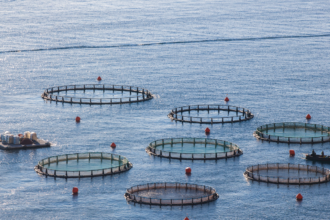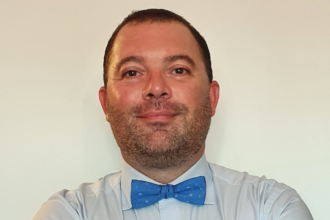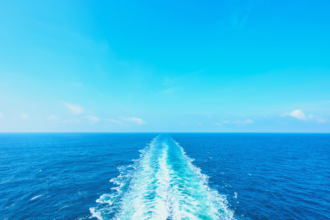Soja de Portugal: Innovation and pioneering spirit
OCEAN CONNECTORS
Over three decades ago, Soja de Portugal took the plunge into the blue bioeconomy, moulding the course of animal nutrition, particularly in aquaculture. In anticipation of regulatory changes and in search of new sources of protein, the company has scored points in innovation. Five questions for António Isidoro, chairman of the board of directors of Soja de Portugal and vice-president of B2E CoLAB.
What are the main results of Soja de Portugal’s work within the blue bioeconomy?
Soja de Portugal joined the blue bioeconomy ecosystem in 1989, when we established a protocol with ICBAS to be the industrial partner in a project to start producing salmon in Portugal. From that moment on, we dedicated ourselves to developing extensive work in the area of animal nutrition. In 1993, we made our first commercial sale of aquaculture feed. Thus, over the last 30 years, we have been creating nutritional solutions for farmed fish, covering a wide range of species. We started with species mainly from the Mediterranean area, such as sea bream and sea bass, but later expanded to other varieties. A significant milestone came at the end of 2006 with the acquisition of Savinor, when we took over the area of co-products from meat and fish. We were then able to reintroduce raw materials derived from these by-products, such as fish oil and fishmeal, into animal nutrition, especially in aquaculture.
A project in the field of the blue bioeconomy developed by Soja de Portugal and of which it is proud.
One of the moments when we became differentiators was in 2013, with the legislative changes that allowed us to use processed animal proteins, namely poultry meat meal and feather meal, as raw materials in the production of nutrition. We were able to anticipate these changes in legislation and so, on the day it came into force, we were able to produce raw materials that had previously been restricted. We were already using these raw materials, but their only destination was pet food. Changing this paradigm has added value to these resources. This work began in 2010 and was carried out by AquaSoja’s technical team, in a phase of preparation and testing for presentation on the market. It was a very important milestone in terms of innovation.
What project or idea would you like to implement in the blue bioeconomy?
Anything that involves new sources of protein, such as insects, which we are already working on, and algae, for example. There are several projects in development and we will continue to work to anticipate any legislative changes, including the possibility of using meat meal, especially from mammals, which is still prohibited by law. Anything that represents new sources of protein is a way forward.
How do you imagine the blue bioeconomy in 30 years’ time?
I visualise ever greater protection of marine resources, which are scarce, with the preservation of traditional sources of marine raw materials and the discovery of new sources that can be derived from the sea, such as algae, for example, and other potential sources that are still unknown. There is a growing awareness of the need to replace raw materials from scarce resources with others, maintaining results or even surpassing them. The growing need to produce more food in a sustainable way, considering the increase in population, will be seen from a much more sustainable perspective from an environmental, economic and biodiversity point of view.
How important is the work carried out by B2E CoLAB?
Savinor and Sorgal, part of the Soja de Portugal group, became founding partners of B2E CoLAB because we have always maintained a collaborative and innovative attitude towards institutions. We were invited by Professor Luísa Valente and we accepted, because we believe that innovation is not only developed through internal mechanisms, with large laboratories and extensive teams. We embraced this challenge because we understand the importance of collaboration in business growth, bringing together the business and scientific contexts. B2E CoLAB represents a kind of start-up and its relevance lies in the crucial role they play in linking the business context in which we operate with the entire scientific context that supports development in the blue bioeconomy. Portuguese companies must realise that they won’t be able to make progress on their own and must take advantage of the knowledge available in Portugal.





